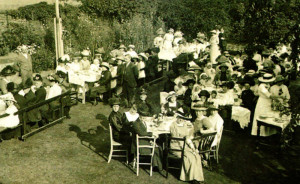
I was born in 1912, and your readers might be interested and surprised at some of the changes that have taken place since then. Until I was 11, we lived in a Cheshire village. It had a butcher’s shop, a combined grocer’s, confectioner’s and general store – and boasted three pubs. It also had six farms. There is not one farm left now. Nobody owned a car, and there was no bus service. We were great walkers. My father, who had to go to meetings in another parish, walked six miles there and back and thought nothing of it! I went to the local church school – one master and one mistress – and they taught the three ‘R’s’ only. We played football on the steeply-sloping village green with a pig’s bladder for a ball and orange boxes for goalposts, which doubled up for wickets in the cricket season.
When I went away to boarding school at the age of 11, armed with only my three ‘R’s’ in my first term, I finished bottom of the class in the lowest form of the school. The masters worked hard, though, to put some knowledge into the head of this country bumpkin and in the end I gained honours in the School Certificate and matriculated to university.
The school fees were £45 per term (including board), which my father paid out of his annual income of £800. There were no grants in those days and few scholarships (and I wasn’t bright enough to get one anyway). Later, he paid for me to go to the University of Liverpool, and later still paid £300 for me to enter into Articles with a Chartered Accountant. I worked for three years without pay, but got £5 at Christmas. When I qualified as a Chartered Accountant with a degree, my salary was just£ 140.
In my formative years we lived in what had been a farmhouse with stone floors in the kitchen, the dairy and the cellars where hams were cured hanging from the ceiling. There was a separate wash house across the small yard with ‘coppers’ beneath which
fires were lit on washdays to heat the water. Scrubbing boards, three-pegged dolly sucks and the mangle were all part of the washday equipment. Ironing was an art, usually done after washing day. The irons were heated in front of the kitchen fire or in one of the ovens. There were goffering and other fancy irons as well as the general flat iron (often used as doorstops nowadays).
My brother and I spent hours exploring the farm buildings. A small hut in the paddock opposite the back door intrigued us because we couldn’t see through the window, and the door was jammed shut because the hinges had rusted solid. When eventually we managed to get in we were staggered to find a two-seater earth closet! We imagined the farmer and his wife after a breakfast of home-cured bacon and eggs retiring to the hut then planning the work for the day while waidng for the spirit to move them!
The old farm machinery was a never-ending source of interest – and danger! There were hay cutters, swede and turnip circular cutters (for the preparation of catde food) and a ghasdy implement called a ‘man trap’ with three-inch teeth which could sever, or at least slice a man’s leg – and,
of course, pitchforks, scythes and sickles. My parents didn’t seem to know how dangerous some of the implements were, or didn’t realise we were playing among them.
I enjoyed my country upbringing, and have never regretted the lack of money. We didn’t need expensive toys, for we had spinning tops, skipping ropes and iron hoops to trundle about; there were conkers for the gathering; we could look for birds’ nests; we collected caterpillars and fed them on netdes and other plants until they turned into chrysales and later into red admiral, peacock and tortoiseshell butterflies; there were blackberries and mushrooms to pick, chickens to feed and eggs to be collected. More than once I had to crawl into the hen house through the hen hatch because I’d left the keys inside and locked the door on the way out.
One last memory is of my mother telling my brother and me: “Dad and I won’t be leaving you much money when we die as we’ve spent it on your educaUon, and that’s something that no Chancellor of the Exchequer will be able to take away from you.”
How right she was!
A. W. Bankes








